小升初英语学习规划.doc
小升初暑假学习计划英语
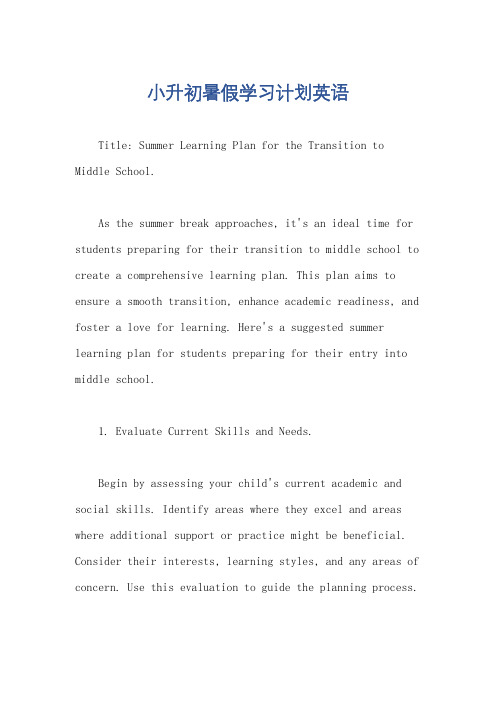
小升初暑假学习计划英语Title: Summer Learning Plan for the Transition to Middle School.As the summer break approaches, it's an ideal time for students preparing for their transition to middle school to create a comprehensive learning plan. This plan aims to ensure a smooth transition, enhance academic readiness, and foster a love for learning. Here's a suggested summer learning plan for students preparing for their entry into middle school.1. Evaluate Current Skills and Needs.Begin by assessing your child's current academic and social skills. Identify areas where they excel and areas where additional support or practice might be beneficial. Consider their interests, learning styles, and any areas of concern. Use this evaluation to guide the planning process.2. Set Clear and Achievable Goals.In consultation with your child, establish clear and achievable learning goals. These goals should align with their interests, abilities, and areas identified for improvement. Goals could include reading a certain number of books, improving math skills, or learning a new hobby.3. Create a Structured Schedule.Develop a structured daily or weekly schedule that includes a balance of learning activities, free play, and relaxation. Plan for regular review sessions to monitor progress and provide feedback. Ensure that the schedule is flexible enough to accommodate unexpected events or changes in interest.4. Reading and Language Arts.Reading is crucial for middle school success. Encourage your child to read books that interest them, both for pleasure and to improve reading comprehension. Encouragethem to write summaries, reviews, or even short stories based on what they read. Additionally, introduce them to basic grammar and writing skills through practice exercises and activities.5. Math and Sciences.Strengthen math skills by practicing concepts learnedin elementary school and introducing new ones. Use hands-on activities, games, and problem-solving exercises to make math fun and engaging. Explore basic science concepts like biology, physics, and chemistry through experiments, videos, and interactive learning resources.6. Social and Emotional Development.Middle school is a time of significant social and emotional growth. Encourage your child to participate in group activities, sports, or clubs to develop social skills and make new friends. Discuss feelings, challenges, and strategies for success with them to foster emotional intelligence.7. Technology and Digital Literacy.With the increasing role of technology in education,it's important to introduce your child to basic digital skills. This includes navigating the internet safely, using educational apps, and understanding basic concepts like data privacy and digital citizenship.8. Health and Wellness.Focus on overall health and wellness by promoting regular exercise, balanced meals, and good sleep habits. Encourage your child to participate in physical activities that they enjoy, such as sports, dance, or yoga. Emphasize the importance of good nutrition and encourage them to try new fruits and vegetables.9. Reflection and Goal Setting for Middle School.As the summer comes to an end, take time to reflect on the learning experiences and goals achieved. Use thisreflection to set new goals for middle school, including academic, social, and personal development.In conclusion, a summer learning plan for the transition to middle school should be comprehensive, structured, and tailored to the individual child's needs and interests. By providing a balance of academic, social, and emotional support, this plan can help students enter middle school with confidence and readiness to succeed.。
小升初衔接英语学习计划

小升初衔接英语学习计划一、学习目标小升初是孩子们学习生涯中的一个重要节点,英语作为一门重要的学科,对孩子们的学业发展有着重要的影响。
因此,为了帮助孩子们顺利完成小升初的英语学习,我们制定了以下的学习计划:1. 培养孩子的英语听、说、读、写能力,提高孩子的英语综合素养;2. 帮助孩子掌握基础的英语语法知识,扩大词汇量;3. 培养孩子的阅读能力,提高孩子的阅读理解能力;4. 帮助孩子培养自主学习的能力,提高学习效率。
二、学习内容1. 听力为了提高孩子们的听力水平,我们将组织孩子们进行丰富多彩的听力练习,包括听文本、听音乐、听故事等,以培养孩子们的英语听力习惯和技巧。
此外,我们还会提供一些英语听力材料,让孩子们在家庭中进行听力练习,以提高他们的听力理解能力。
2.口语我们将通过游戏、故事等形式,帮助孩子们扩展词汇量,培养他们的口语表达能力。
我们也会鼓励孩子们参与英语角活动,提高他们的口语交流能力。
3.阅读我们将组织孩子们进行丰富多彩的阅读练习,通过阅读名著、小说、诗歌等文学作品,提高孩子们的阅读理解能力和文学欣赏能力。
同时,我们还会提供一些英语阅读材料,让孩子们在家中进行阅读练习。
4.写作我们将组织孩子们进行各种写作练习,包括写日记、写作文、写邮件等,以提高孩子们的写作能力和表达能力。
5.语法我们将通过系统的课堂教学,帮助孩子们掌握基础的英语语法知识,包括词汇、句子结构、语法规则等。
三、学习方法1. 注重多维度学习我们将通过听、说、读、写等多种方式,培养孩子们的英语综合能力。
同时,我们也会提供在线学习资源,让孩子们能够在家中进行自主学习。
2. 注重趣味学习我们将通过游戏、故事等形式,创设轻松愉快的学习氛围,减少孩子们的学习压力,激发他们学习的兴趣和积极性。
3. 注重反馈我们将定期组织考试和测验,及时给孩子们反馈学习成绩,帮助他们发现学习中存在的问题,并进行针对性的辅导。
4.注重培养自主学习能力我们会引导孩子们养成良好的学习习惯,让他们能够自主进行学习,提高学习效率。
小升初暑假学习英语计划
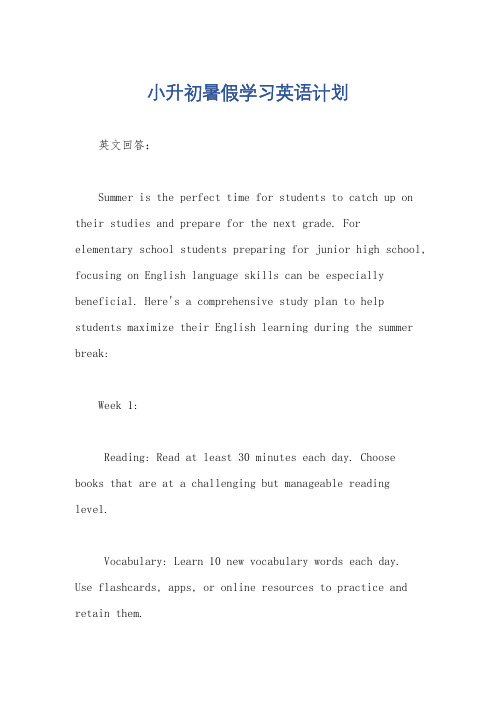
小升初暑假学习英语计划英文回答:Summer is the perfect time for students to catch up on their studies and prepare for the next grade. Forelementary school students preparing for junior high school, focusing on English language skills can be especially beneficial. Here's a comprehensive study plan to help students maximize their English learning during the summer break:Week 1:Reading: Read at least 30 minutes each day. Choose books that are at a challenging but manageable reading level.Vocabulary: Learn 10 new vocabulary words each day.Use flashcards, apps, or online resources to practice and retain them.Grammar: Review basic grammar concepts such as partsof speech, sentence structure, and verb tenses. Complete practice exercises to reinforce your understanding.Week 2:Writing: Write a short story, essay, or poem each week. Focus on developing strong ideas, organizing your thoughts, and using correct grammar and spelling.Speaking: Practice speaking English as much as possible. Engage in conversations with native speakers,join a language exchange group, or use online platforms to connect with other learners.Listening: Listen to podcasts, watch movies, or engage in conversations that expose you to authentic English speech. Pay attention to pronunciation, intonation, and vocabulary.Week 3:Reading: Read more complex texts, such as articles from newspapers or magazines. Discuss the main ideas and supporting details with a parent or tutor.Vocabulary: Continue learning new vocabulary words, focusing on synonyms and antonyms. Explore the nuances of different words to expand your vocabulary.Grammar: Practice advanced grammar concepts, such as conditional sentences, modal verbs, and reported speech. Seek help from a tutor or online resources if needed.Week 4:Writing: Write longer and more structured essays or reports. Include an introduction, body paragraphs, and conclusion. Focus on clarity, coherence, and correct language usage.Speaking: Participate in debates or discussions on current events or topics of interest. Express your opinionsclearly and respectfully.Listening: Listen to speeches or presentations by native English speakers. Pay attention to the speaker's tone, body language, and persuasive techniques.Week 5:Reading: Read a variety of genres, including fiction, non-fiction, and poetry. Analyze the literary devices, themes, and writing styles used by different authors.Vocabulary: Review and reinforce all the vocabulary learned throughout the summer. Use them in daily conversations and writing tasks.Grammar: Conduct a comprehensive grammar review. Ensure that you have a strong grasp of all the grammar concepts necessary for junior high school.Week 6:Writing: Prepare for the English writing section of the junior high school entrance exam. Practice timedwriting tasks and focus on writing clear, concise, andwell-organized essays.Speaking: Engage in mock interviews or presentations to practice your speaking skills. Pay attention to your fluency, pronunciation, and confidence.Listening: Listen to audio recordings or speeches related to the junior high school entrance exam topics. This will help you familiarize yourself with the types of listening passages you may encounter.Week 7:Review: Spend time reviewing all the English concepts covered during the summer. Focus on identifying areas where you need additional support and seek assistance from atutor or teacher.Practice: Continue practicing your reading, writing,speaking, and listening skills through various activities.Relax: Take some time to relax and unwind before the start of the new school year.Week 8:Final Preparations: Make sure you have all the necessary materials for the junior high school entrance exam, such as writing utensils, erasers, and a watch.Rest: Get a good night's sleep before the exam.Confidence: Believe in yourself and your ability to do well on the exam.This comprehensive study plan will provide students with a structured and effective approach to improve their English language skills during the summer break. By following this plan consistently, students can gain confidence, expand their knowledge, and prepare themselves for success in junior high school.中文回答:暑期英语学习计划。
小学小升初英语备考方案

小学小升初英语备考方案1. 前言小升初是每个小学生都会经历的一次重要考试,英语作为其中的一科目,备考也是必不可少的。
本文将为大家提供一份针对小学小升初英语备考的方案,希望能够帮助大家更好地准备考试。
2. 学习目标在备考小升初英语时,我们的学习目标应该明确。
根据学习大纲和历年考试题分析,我们可以确定以下学习目标: - 掌握基础词汇和句型 - 理解常用的英语语法知识 - 能够正确运用所学知识进行听、说、读、写的训练 - 培养良好的学习习惯和考试习惯3. 学习计划在备考英语时,我们需要制定一个合理的学习计划,以便更好地安排学习时间和内容。
下面是一个备考英语的学习计划示例:第一周•复习之前学过的基础词汇和句型•学习并掌握新的词汇和句型第二周•复习和巩固已学词汇和句型•学习语法知识并做相关练习第三周•进行听力训练,积累听力技巧•阅读练习,提高阅读理解能力第四周•通过口语练习提高口语表达能力•写作训练,培养写作能力第五周•复习所有已学内容并进行模拟考试•分析错题,并进行针对性的复习4. 学习方法备考英语时,正确的学习方法可以事半功倍。
下面是几种有效的学习方法供大家参考:制定学习计划既然已经制定了学习计划,就要按照计划进行学习。
合理安排时间,每天坚持学习,不要拖延。
多练习英语是一门实践性很强的科目,光靠死记硬背是远远不够的。
多做练习题,对于语感的培养和运用的熟练度有很大的帮助。
多听多读英语的听力和阅读是备考重点,多听多读可以提高听力理解和阅读理解的能力。
可以通过听英文歌曲,看英文电影或者电视剧,阅读英文故事书等方式进行训练。
注重口语强化口语是考试中的一个重要环节,可以通过与同学或外教进行口语练习,增加口语表达的机会。
写作训练写作是备考中的考察点之一,可以通过写作练习提高写作能力。
可以选择一些话题,进行写作练习,并请老师或同学进行修改和指导。
5. 备考注意事项备考小升初英语时还有一些注意事项需要我们务必注意:保持积极的心态备考是一个相对紧张和有压力的过程,但是保持积极的心态是非常重要的。
小升初学习英语如何规划
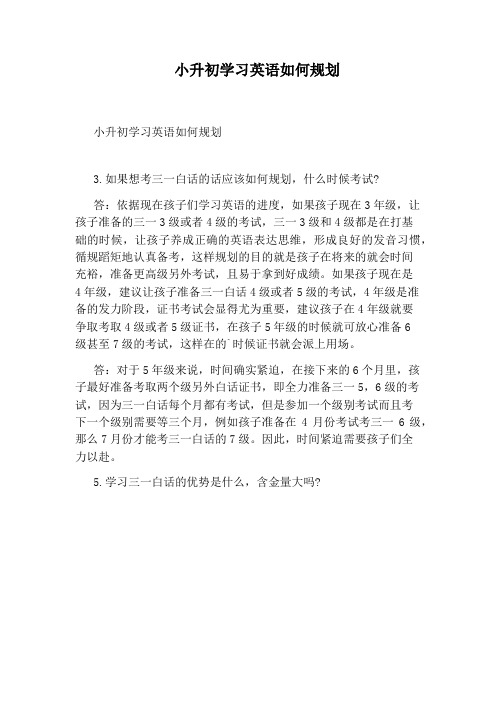
小升初学习英语如何规划
小升初学习英语如何规划
3.如果想考三一白话的话应该如何规划,什么时候考试?
答:依据现在孩子们学习英语的进度,如果孩子现在3年级,让孩子准备的三一3级或者4级的考试,三一3级和4级都是在打基
础的时候,让孩子养成正确的英语表达思维,形成良好的发音习惯,循规蹈矩地认真备考,这样规划的目的就是孩子在将来的就会时间
充裕,准备更高级另外考试,且易于拿到好成绩。
如果孩子现在是
4年级,建议让孩子准备三一白话4级或者5级的考试,4年级是准
备的发力阶段,证书考试会显得尤为重要,建议孩子在4年级就要
争取考取4级或者5级证书,在孩子5年级的时候就可放心准备6
级甚至7级的考试,这样在的`时候证书就会派上用场。
答:对于5年级来说,时间确实紧迫,在接下来的6个月里,孩子最好准备考取两个级另外白话证书,即全力准备三一5,6级的考试,因为三一白话每个月都有考试,但是参加一个级别考试而且考
下一个级别需要等三个月,例如孩子准备在4月份考试考三一6级,那么7月份才能考三一白话的7级。
因此,时间紧迫需要孩子们全
力以赴。
5.学习三一白话的优势是什么,含金量大吗?。
小升初英语学习教学计划

小升初英语学习教学计划一、教学目标1. 帮助学生建立英语学习的兴趣和自信心。
2. 培养学生的英语听、说、读、写能力。
3. 学习英语的基本语法和词汇。
4. 培养学生的英语思维和交际能力。
二、教学内容1. 听力:听力练习可以帮助学生提高对英语语音和语调的理解能力,增强学生的英语听力技巧。
2. 口语:口语练习可以帮助学生提高自己的英语口语表达能力,培养学生的英语思维和表达能力。
3. 阅读:阅读练习可以帮助学生提高阅读理解能力,积累更多的英语词汇和语法知识。
4. 写作:写作练习可以帮助学生提高自己的英语写作能力,培养学生的逻辑思维和表达能力。
5. 语法:学习英语基本语法知识,帮助学生掌握英语句子的构成和用法。
三、教学方法1. 多种途径的教学方法,如听、说、读、写结合。
2. 利用多媒体教学手段,如音频、视频等。
3. 鼓励学生参与课堂讨论和互动,培养学生的英语交际能力。
4. 组织学生参加小组合作学习,培养学生的合作精神和团队意识。
四、教学计划1. 第一阶段(1-2个月)1.1 听力练习:利用英语磁带和mp3等多媒体途径,帮助学生提高听力水平。
1.2 口语练习:组织学生进行角色扮演和对话练习,提高学生的口语表达能力。
1.3 阅读练习:选择适合学生水平的英语阅读材料,帮助学生提高阅读理解和识字能力。
1.4 写作练习:鼓励学生进行日记、作文等写作练习,提高学生的写作能力。
1.5 语法讲解:介绍英语基本语法知识,帮助学生掌握句子的构成和用法。
2. 第二阶段(3-4个月)2.1 听力练习:继续进行听力练习,帮助学生提高对英语语音和语调的理解能力。
2.2 口语练习:组织学生进行口语表达练习,培养学生的思维和表达能力。
2.3 阅读练习:选择更难的英语阅读材料,帮助学生提高阅读理解和识字能力。
2.4 写作练习:继续进行写作练习,鼓励学生进行短文写作,培养学生的逻辑思维和表达能力。
2.5 语法讲解:继续学习英语基本语法知识,帮助学生掌握句子的构成和用法。
小升初学习计划(英语)(1)

小升初学习计划(英语)(1)英豪教育学习小升初计划(英语)1第一部分如何搞好小升初英语教学的衔接初中一年级是初中阶段的第一年,这一年,学生不仅要适应新的同学和老师,适应各种新环境,还要适应新的科目,英语。
正所谓万事起头难,头起得不好,后面的工作就难做,就有煮夹生饭的感觉;头起好了,后面的工作就好做得多。
小学生在经历了六年的奋力拼搏之后都顺利地升入了中学。
不论是成绩好的学生还是成绩暂时落后的学生,在假期中,都心里暗下决心,一定争取在中学取得理想成绩,尤其是一定要在初一阶段学好英语。
从小学到初中,英语学习的内容及进度有很大的改变,经常有家长问这样一个问题:在小学里孩子的英语从未低于过九十分,为什么进初中后连八十分都考不到呢?接下来我们来看看大多数初一学生所面临的英语学习问题。
从小学到初中,英语学习内容的增大使部分学习主动性差的学生无法适应。
初中英语学习内容的增大主要表现在词汇增多和每篇文章长度增加以及对语法的认知和运用。
由于课时数是相对固定的,所以在词汇教学方面,初中生有必要进行课前预习,这一点大大有别于小学生主要上课时有老师教,因此有些学生感到很难接受,为什么单词还没教就要进行听写练习呢?另外,初中的词汇不仅要记住原形,还要记住变化后的词形,如名词的复数形式;动词的第三人称单数,现在分词,过去式,过去分词;形容词,副词的比较级和最高级,以及各类词性的转换。
比如说从名词luck,可以衍生出形容词lucky,副词luckily和它们的反义词分别为unlucky和unluckily,还有,lucky的比较级是luckier,而luckily的比较级是moreluckily.同时,小学学过的部分语法对后来的学习造成很大干扰。
比如在学一般现在时和一般过去时时,学生总喜欢用am,is,are,was,were来提问。
例如,在将She likes English;They went to school yesterday.等类句子变成疑问句时,学生常常犯的错误是:Is she likes English?;Were they went to school yesterday?这类错误的原因是小学教材在初学阶段过多地安排了be动词am,is,are的学习内容,又因是启蒙阶段,导致对学生的影响较为深刻。
小学英语小升初长期备考学习计划

小学英语小升初长期备考学习计划==============================================学习目标:1、夯实小学阶段语法知识(词法、句法)2、夯实小学阶段词汇(较人教版单词量略大)3、熟悉小学数学英语词汇(面试需要)4、足够量的听力练习5、一定量的发音知识(辩音;连读、失去爆破等发音规则)6、足够篇幅的全英文阅读(熟悉全英文环境,延长阅读专注力和持续程度)7、能写出无明显语法错误的、主题清楚、内容连贯的英语小短文。
8、能进行全英文自我介绍和全英文回答简单面试问题学习计划:积累阶段(>12 months):根据学生目前动态的词汇量,进行语法知识教学,并保证一定量的单选、首字母、完形填空的练习。
每次课需要添加朗读纠音内容。
逐步添加听力内容。
阶段性进行综合练习(听力+阅读+语法)。
冲刺阶段(6 months):以题带点,保证一定量的书面练习(语法、阅读,小作文等题型),磨炼速度和准度。
雕琢阶段(只对学有余力学生):需要逐步加大听力强度(加速、加长度)、培养英语口头表达能力(自我介绍,全英口语回答问题)、更加严格地进行纠音。
摸底小练习姓名:年级:1.There ________some paper and a pen on the desk.A.is B.are C.have D.has2. 请将下列单词单数变复数:tooth-foot-mouse-woman-3.请填写适当的冠词China is ______ ancient country with _____ long history.China has _____ population of 12 hundred million. _____ Chinese people are _____ great people.4.写出下列动词的过去时形式和现在进行时形式E.g. : like liked likinghave gobe doswim get5.用动词所给的适当形式填空Peter ________ (play) basketball twice a week.2. Do you believe what he ________ (say) just now?3. Look! The lazy cat ____________ (sleep) in the sofa.4. There _______(be) a book and two pens on the desk.5._____you _______________(see ) a film tomorrow morning?6. She ____________(not play) the guitar at the moment.7. What ______his father usually _______(do) in the evening ?8. They ______________ ( have ) a meeting next week, aren't they?9. Both he and I ________ (be) teachers.10. I ___________ (not feel ) very well yesterday .11. He put on his coat and _________ (go) out.12. Lei Feng often ____________ (help) others and he was helpful.13.Next Sunday, we ___________________ (clean) up the park.14. Hurry! Your mother ____________ (wait) for you at the school gate.6. 填上适当的介词:1. Look _____ the picture. It's picture___ my school.2. There is a school building ____ my school. It has five floors.______ the school building, there is a big playground. ________school, the children always play ball games there.3. My classroom is____ the fifth floor. It's big and clean.4. Miss Li is our class teacher. She comes ______ school early every morning. She comes ____bicycle. Then she does morning exercises ______us. She likes sports. Tomorrow is her birthday. We will make a card ___ her. We love her very much.5. There are some apples _____ the tree.7.翻译:第五:第八:第九:第十二:第二十:朗读以下语段:It was Sunday. I never get up early on Sundays. I sometimes stay in bed until lunch time. Last Sunday I got up very late. I looked out of the window. It was dark outside. 'What a day!' I thought. 'It's raining again.' Just then, the telephone rang. It was my aunt Lucy.' I've just arrived by train,' she said. 'I'm coming to see you.' 'But I'm still having breakfast,' I said. 'What are you doing?' she asked. ‘I’m having breakfast,' I repeated. 'Dear me,' she said. 'Do you always get up so late? It's one o'clock!''小提高:There are 36 biscuits. They will be divided equally and given to a group of people whose number is odd and larger than 3. How many biscuits will each one receive?我学到的解题思路是什么?The keys:1.A there be 句型,就近原则2.tooth-teeth, foot-feet, mouse-mice, woman-women3.An, a ,the, the, /4.had having; went going; was being; did doing; swam swimming ;got getting5.Plays ,said, is sleeping, is, are going to see,is not playing, does do, are going to have, are, did not feel, went, helps, are going to clean; is waiting6.At of ,in near/ besides after; on, to by with to, on7.fifth, eighth, ninth,twelfth,twentieth。
小学升初中后的英语学习策略
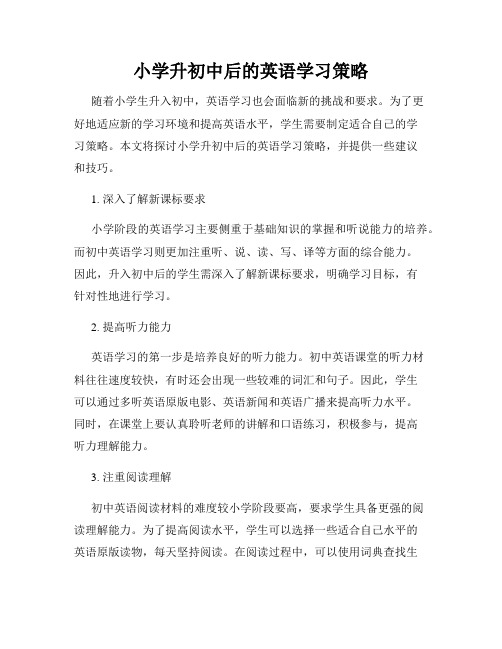
小学升初中后的英语学习策略随着小学生升入初中,英语学习也会面临新的挑战和要求。
为了更好地适应新的学习环境和提高英语水平,学生需要制定适合自己的学习策略。
本文将探讨小学升初中后的英语学习策略,并提供一些建议和技巧。
1. 深入了解新课标要求小学阶段的英语学习主要侧重于基础知识的掌握和听说能力的培养。
而初中英语学习则更加注重听、说、读、写、译等方面的综合能力。
因此,升入初中后的学生需深入了解新课标要求,明确学习目标,有针对性地进行学习。
2. 提高听力能力英语学习的第一步是培养良好的听力能力。
初中英语课堂的听力材料往往速度较快,有时还会出现一些较难的词汇和句子。
因此,学生可以通过多听英语原版电影、英语新闻和英语广播来提高听力水平。
同时,在课堂上要认真聆听老师的讲解和口语练习,积极参与,提高听力理解能力。
3. 注重阅读理解初中英语阅读材料的难度较小学阶段要高,要求学生具备更强的阅读理解能力。
为了提高阅读水平,学生可以选择一些适合自己水平的英语原版读物,每天坚持阅读。
在阅读过程中,可以使用词典查找生词和短语,理解文章的大意和关键信息。
同时,培养阅读速度和理解深度,提高整体阅读能力。
4. 多说多写英语口语和写作能力是学生英语学习的重点和难点。
为了提高口语能力,学生可以参加英语角、加入英语俱乐部,与其他学生一起练习口语表达。
此外,还可以利用语音软件进行自我录音和评估,提高发音和流利程度。
对于写作能力的提高,学生可多做英语作文,注意语法和词汇的正确使用,并请老师或同学进行批改和建议。
5. 创造学习机会学习并不仅仅局限于课堂上,学生可以主动创造学习机会。
例如,可以邀请英语外教到家中进行英语交流,找一些英语学习APP进行学习,参加英语角和英语比赛等等。
通过积极主动地参与和实践,学生能够更好地巩固知识,提高学习效果。
6. 培养好学习习惯好的学习习惯对学生的英语学习至关重要。
学生要合理安排学习时间,坚持每天进行英语学习。
小升初英语课程计划

小升初英语学习计划
学生概况:
学生现为六年级学生,处于即将小升初关键时期,决定进行以下的课程安排。
1.
内容:
(1)26个字母的(1课时)
(2)元音组合(2-3课时)
(3)辅音组合(2课时)
(4)国际音标添加(复习时添加)
目的:孩子单词的认读能力不强,为了提高其对单词的认读能力,配合小学3-6册教材单词进行记忆,提高听力。
后期进行国际音标的添加,提升学生的自主学习能力,不害怕说英语。
2.
内容:
2内容
; a ; ; ; ; ; ; .
目的:考虑到学生将进入外教班的学习,为了更好地配合外教班的教学,提高英语口语表达能力,提升英语听力能力和口语的交际能力,从而添加内容。
课时安排:
(1)每次课安排15-20分钟口语训练。
(2)同步课程知识点,进行加强和巩固。
3.小学知识点汇总复习
内容:
国际音标;冠词;名词;代词;介词;连词;形容词;副词;动词;动词时态;句子;基本句型;完形填空;阅读理解;书面表达(结合新概念)
目的:衔接小升初考试。
课程安排:
(1)完形填空,阅读理解(每次课堂练习进行,20-30分钟)(2)书面表达:写人篇,记事篇,状物篇,日记篇
每项1-2次课,结合口语表达,书面表达和家庭作业完成教学。
(3)其他知识点
每项1-3次课,结合新概念进行讲解,通过口语表达,课堂练习和家庭作业巩固知识点。
4.新概念
内容:结合小升初大纲讲解语法
目的:让学生的学习有教材可依,避免枯燥,单调地学习语法,拓展孩子的英语词汇量。
英语小升初学习规划
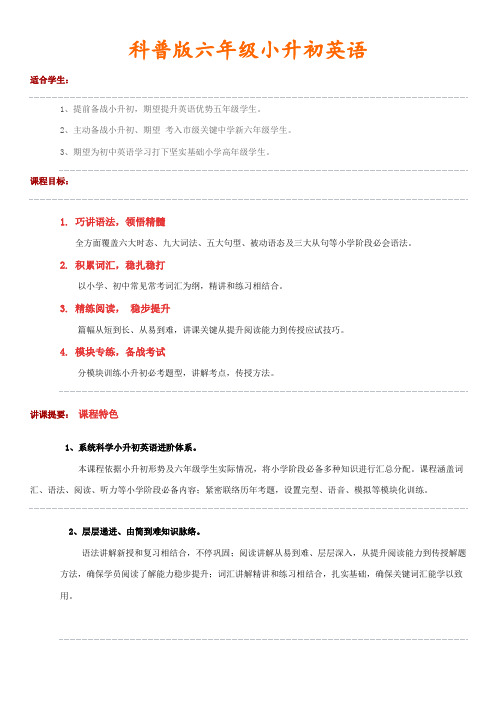
科普版六年级小升初英语
适合学生:
1、提前备战小升初,期望提升英语优势五年级学生。
2、主动备战小升初、期望考入市级关键中学新六年级学生。
3、期望为初中英语学习打下坚实基础小学高年级学生。
课程目标:
1. 巧讲语法,领悟精髓
全方面覆盖六大时态、九大词法、五大句型、被动语态及三大从句等小学阶段必会语法。
2. 积累词汇,稳扎稳打
以小学、初中常见常考词汇为纲,精讲和练习相结合。
3. 精练阅读,稳步提升
篇幅从短到长、从易到难,讲课关键从提升阅读能力到传授应试技巧。
4. 模块专练,备战考试
分模块训练小升初必考题型,讲解考点,传授方法。
讲课提要:课程特色
1、系统科学小升初英语进阶体系。
本课程依据小升初形势及六年级学生实际情况,将小学阶段必备多种知识进行汇总分配。
课程涵盖词汇、语法、阅读、听力等小学阶段必备内容;紧密联络历年考题,设置完型、语音、模拟等模块化训练。
2、层层递进、由简到难知识脉络。
语法讲解新授和复习相结合,不停巩固;阅读讲解从易到难、层层深入,从提升阅读能力到传授解题方法,确保学员阅读了解能力稳步提升;词汇讲解精讲和练习相结合,扎实基础,确保关键词汇能学以致用。
课程安排。
小升初英语复习计划

小升初英语复习计划英语是学生小升初考试中的一门重要科目。
为了帮助孩子顺利应对小升初英语考试,制定一个合理的复习计划是非常必要的。
下面是一个可行的小升初英语复习计划,希望对孩子们有所帮助。
第一阶段:背单词和短语(3天)在这个阶段,我们要重点关注英语单词和常用短语的背诵。
建议每天花费1小时的时间进行背诵,并进行词汇的巩固。
第二阶段:语法和句型练习(4天)掌握英语的基本语法和常见的句型是小升初英语考试的重要内容。
在这个阶段,我们要注重语法和句型的练习。
建议每天花费1小时的时间进行语法和句型的练习。
第三阶段:阅读理解(3天)阅读理解是小升初英语考试中的一道重要题型。
在这个阶段,我们要注重阅读理解的训练。
建议每天花费1小时的时间进行阅读理解练习,并逐渐提高答题速度和准确率。
第四阶段:听力练习(2天)听力是小升初英语考试中的一个重要环节。
在这个阶段,我们要注重听力训练。
建议每天花费半小时的时间进行听力练习,并逐渐提高听力理解和反应能力。
第五阶段:写作训练(2天)写作是小升初英语考试中的一个关键部分。
在这个阶段,我们要注重写作训练。
建议每天花费半小时的时间进行写作练习,并逐渐提高写作能力和表达水平。
第六阶段:模拟测试(2天)在小升初英语考试前的最后阶段,进行模拟测试是非常必要的。
通过模拟测试,可以了解孩子在各个方面的掌握情况,并进行有针对性的复习和提高。
总结:通过以上的复习计划,孩子们可以全面而有针对性地进行小升初英语的复习。
同时,家长们也要给予孩子充分的支持和鼓励,帮助他们建立学习的信心,为小升初英语考试取得好成绩打下基础。
最后,祝愿所有即将参加小升初英语考试的孩子们都能取得优异的成绩,顺利进入心仪的中学!。
小升初英语学习规划(通用9篇)

小升初英语学习规划小升初英语学习规划(通用9篇)学习方法是通过学习实践总结出的快速掌握知识的方法。
因其与学习掌握知识的效率有关,越来越受到人们的重视。
下面和小编一起来看小升初英语学习规划,希望有所帮助!小升初英语学习规划篇11.小升初英语备考,从哪些方面准备呢?首先不管以前英语学习的程度如何,需要坚持词汇打好基础,虽然小升初并没有固定的词汇量,但是不管是语法,阅读都需要词汇量,词汇也是英语学习的根基,如果没有大量的词汇做基础,小升初英语考试很难取得好成绩。
除了基本的基础知识以外,更重要的是小升初的应试技巧训练,掌握解题要点也很重要,根据近年小升初的考生考试情况总结,大部分孩子有了基础能力,考场上却无法正常发挥,不出成绩,这就是缺少应试技巧的弊端,单词有了,语法也会了,但是为什么考试的时间丢分了,所以需要孩子在考试之前做大量的模拟题,及对小升初真题强化训练,掌握小升初考试解题技巧,也可以根据做题了解孩子所欠缺的部分,进行专项补充。
2.如何利用最后一年的时间进行学习规划呢?根据一年的时间规划,做了每个阶段的学习安排。
暑期:语法开始第一轮学习,并进行词汇积累。
将语法体系按词法,句法,时态语态及综合能力进行系统学习,如果自己复习的话可以买一本初中系统语法总结的书进行学习,并做专项练习,需要家长或教师进行辅导;暑假要开始词汇学习,词汇学习可以参考新概念课本,掌握生词除了要掌握拼读,词义外,还要掌握其用法,如动词要掌握单词各种时态的变化,固定搭配等。
通过阅读文章等方式培养语感,可以选择英文的小说来阅读,或者是通过看英文的电影或电视来培养语感,但是务必选择标准的英语,比如选择好莱坞电影,迪斯尼的电影等。
秋季:完成第一轮语法学习及词汇积累。
继续语法学习,争取在12月份完成第一轮的语法学习。
根据往年的经验,最先进行小升初考试多在1月份开始,这一批考试的学校仅是少数,完成第一轮的学习对于应付第一批的考试非常必要。
同时要继续词汇学习及语感培养,并做部分英语练习。
小升初英语复习学习计划
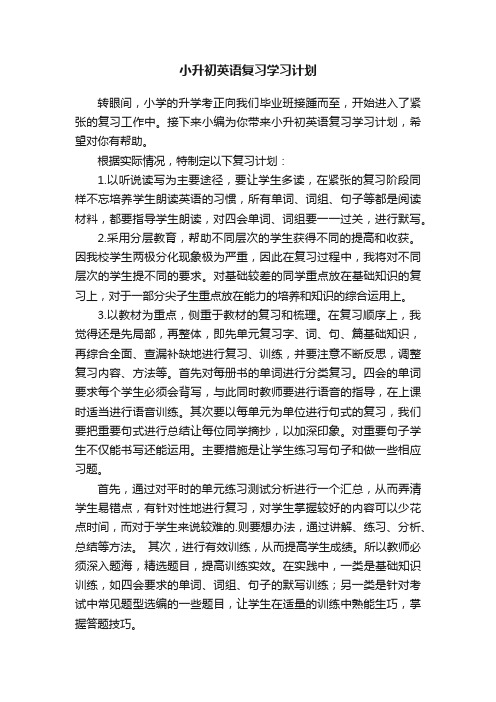
小升初英语复习学习计划转眼间,小学的升学考正向我们毕业班接踵而至,开始进入了紧张的复习工作中。
接下来小编为你带来小升初英语复习学习计划,希望对你有帮助。
根据实际情况,特制定以下复习计划:1.以听说读写为主要途径,要让学生多读,在紧张的复习阶段同样不忘培养学生朗读英语的习惯,所有单词、词组、句子等都是阅读材料,都要指导学生朗读,对四会单词、词组要一一过关,进行默写。
2.采用分层教育,帮助不同层次的学生获得不同的提高和收获。
因我校学生两极分化现象极为严重,因此在复习过程中,我将对不同层次的学生提不同的要求。
对基础较差的同学重点放在基础知识的复习上,对于一部分尖子生重点放在能力的培养和知识的综合运用上。
3.以教材为重点,侧重于教材的复习和梳理。
在复习顺序上,我觉得还是先局部,再整体,即先单元复习字、词、句、篇基础知识,再综合全面、查漏补缺地进行复习、训练,并要注意不断反思,调整复习内容、方法等。
首先对每册书的单词进行分类复习。
四会的单词要求每个学生必须会背写,与此同时教师要进行语音的指导,在上课时适当进行语音训练。
其次要以每单元为单位进行句式的复习,我们要把重要句式进行总结让每位同学摘抄,以加深印象。
对重要句子学生不仅能书写还能运用。
主要措施是让学生练习写句子和做一些相应习题。
首先,通过对平时的单元练习测试分析进行一个汇总,从而弄清学生易错点,有针对性地进行复习,对学生掌握较好的内容可以少花点时间,而对于学生来说较难的.则要想办法,通过讲解、练习、分析、总结等方法。
其次,进行有效训练,从而提高学生成绩。
所以教师必须深入题海,精选题目,提高训练实效。
在实践中,一类是基础知识训练,如四会要求的单词、词组、句子的默写训练;另一类是针对考试中常见题型选编的一些题目,让学生在适量的训练中熟能生巧,掌握答题技巧。
准备几本优秀的习题集、试卷集,供我们参考、选择,经过复印、剪贴和重组,就能得到最适合我们学生、教学实际的练习,为达到有效的训练目标创造条件。
工作计划之小升初英语学习计划

小升初英语学习计划【篇一:小升初复习计划-英语】小升初英语复习计划1 龙文教育中国领先的中小学教育品牌2 龙文教育中国领先的中小学教育品牌3 龙文教育中国领先的中小学教育品牌【篇二:小升初英语复习计划】小升初英语复习计划一、全面复习抓基础,帮助学生全面系统地复习所学过的知识(一)过好单词关,单词是学习英语的基础,针对目前学生中存在的基础差,习惯差的现状,根据小学生的年龄特点以及记忆与遗忘的规律,学生在反复记忆相同的内容能使这些内容长期储存在记忆里,不易遗忘。
因此我准备从不同角度,用不同方法帮助学生复习单词。
1、按词性归类复习单词。
2、按所含元音字母以及字母组合归类复习资料3、按词汇表复习单词加强单词的朗读与默写,给学生明确的任务,并采用短频快的方式,这样学生一方面可以做好充分准备,一方面容易获得成功。
当然对于极个别学生来说,还要区别对待,给他们适当降低要求和难度,使他们也能尽最大努力过好单词关。
(二)过好词组关词组是学习英语的关键,它是复习单词的良好途径,同时又是学习句子的基础。
准备将词组复习与单词分类学习相联系,在复习的同时一起复习词组让学生在复习的同时掌握词组的构成的规律。
(三)过好句子关句子是学习英语的重点。
通过四年的学习,学生已经掌握了一定数量的句型及日常交际英语,大多数学生现在已经能较自如地运用这些句子,但对一部分学生来说,还处于朦胧状态,因此准备通过以下几个方面来梳理所学过的句子。
1、指导学生在语境中复习句子,让学生分清日常交际用语的运用场合。
2、根据句子类型指导学生在比较中复习句子,交给学生适当的语法知识。
3、指导学生在表演中运用句子,是复习课同样生动有趣。
(四)过好阅读关阅读短文能让学生全面运用所学知识,因此指导学生认真阅读也是英语复习的重要环节。
总之,要把单词、词组、句子和短文作为一个有机整体,在复习过程中将他们紧密结合起来,合理安排教学内容,提高学生整体运用知识的能力。
另外,还要加强对听力和语法的复习力度,给学生整理归纳系统的语法知识点。
小升初英语教学计划
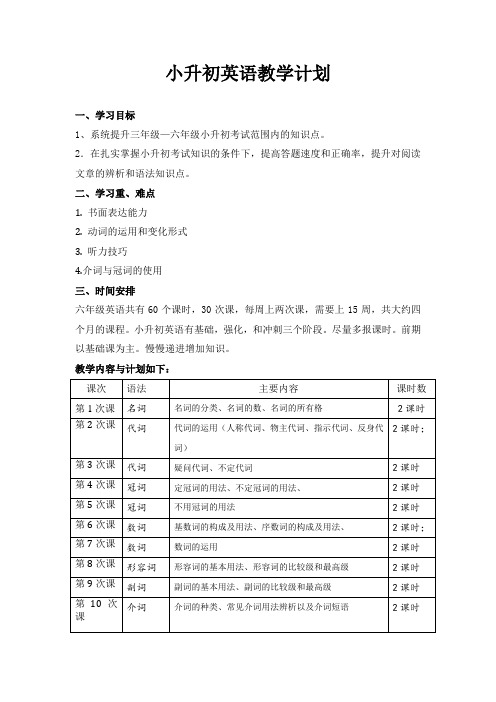
小升初英语教学计划一、学习目标1、系统提升三年级—六年级小升初考试范围内的知识点。
2.在扎实掌握小升初考试知识的条件下,提高答题速度和正确率,提升对阅读文章的辨析和语法知识点。
二、学习重、难点1. 书面表达能力2. 动词的运用和变化形式3. 听力技巧4.介词与冠词的使用三、时间安排六年级英语共有60个课时,30次课,每周上两次课,需要上15周,共大约四个月的课程。
小升初英语有基础,强化,和冲刺三个阶段。
尽量多报课时。
前期以基础课为主。
慢慢递进增加知识。
教学内容与计划如下:除了以上的课时安排,还需要综合能力一综合特训串讲词法部分 2课时综合能力二句法部分 6课时综合能力三词汇辨析 6课时综合能力四日常交际用语 4课时综合能力五阅读理解与简答 4课时综合能力六完成句子 6课时综合能力七写作 10课时综合能力八..完型填空专项训练第二遍每次上都要加强综合能力九.听力训练技巧总结与讲析综合能力十. 小升初语音训练除了紧跟正常的教学计划,更主要的要侧重小升初的系统复习,把散乱的知识点系统化,整体化。
紧跟小升初的考试题型加强练习。
针对时态易混淆的问题,我们要系统的理顺知识点,加强练习,并总结各种易考题型,及易错题型。
完形填空和阅读题型在小升初考试分值比例较大,同时也是对英语能力的一种综合考验,所以要加强练习,词汇的积累以及做题方法的总结。
小升初中任务型阅读,完成对话,及完成句子属于易得分题型。
也是我们学习的重点。
家长也应积极监督、督促学生按时完成作业,且提高作业质量。
小升初暑假英语学习计划

小升初暑假英语学习计划Summer vacation is coming, and it's time to plan for some English learning in the holidays. As a student preparing for the upcoming junior high school, it's important to continue improving English skills during the break. An effective and well-structured English learning plan will not only help to maintain and enhance existing knowledge but also serve as a preparation for the challenging junior high school English curriculum.Week 1-2: Reading and ComprehensionFor the first two weeks of the summer vacation, the focus will be on reading and comprehension. Reading is an essential component of English learning, as it helps improve vocabulary, grammar, and overall language skills. The goal is to read at least two English books from different genres, such as fiction, non-fiction, and classic literature.Reading Schedule:- Day 1-3: Choose and start reading the first book- Day 4-6: Continue reading the first book- Day 7-9: Finish the first book and write a summary or book review- Day 10-13: Choose and start reading the second book- Day 14: Finish the second book and write a summary or book reviewIn addition to reading books, it's important to practice comprehension skills by answering questions and discussing the books with family or friends. This will help improve the ability to understand and interpret written English.Week 3-4: Writing PracticeWriting is another important aspect of English learning, and it's essential to continue practicing and developing writing skills during the summer vacation. During the third and fourth weeks, the focus will be on writing practice, with an emphasis on essay writing and creative writing.Writing Schedule:- Day 1-3: Choose a topic and write a 300-400 word essay- Day 4-6: Revise and improve the essay, with a focus on grammar and vocabulary- Day 7-9: Choose a different topic and write another 300-400 word essay- Day 10-13: Revise and improve the second essay- Day 14: Choose a creative writing prompt and write a short story or poemWriting practice will not only help improve writing skills, but also enhance grammar, vocabulary, and creativity. It's important to seek feedback from teachers, parents, or peers to improve writing skills.Week 5-6: Speaking and ListeningIn the fifth and sixth week of the summer vacation, the focus will be on speaking and listening skills. It's important to practice speaking and listening to improve pronunciation, fluency, and comprehension.Speaking and Listening Schedule:- Day 1-3: Find a English-speaking TV show or movie to watch and actively listen to the dialogue- Day 4-6: Practice speaking by summarizing the plot or discussing the TV show or movie with a family member or friend- Day 7-9: Listen to English podcasts or radio shows and take notes on the content- Day 10-13: Practice speaking by summarizing the podcasts or radio shows to improve fluency- Day 14: Choose a topic and have a conversation in English with family or friends, focusing on pronunciation and fluencySpeaking and listening practice can also be supplemented with language exchange partners, online speaking groups, or English tutors to further practice and improve speaking and listening skills.Week 7-8: Vocabulary and GrammarDuring the last two weeks of the summer vacation, the focus will be on vocabulary and grammar. It's important to review and expand vocabulary, as well as strengthen grammar skills in preparation for junior high school English curriculum.Vocabulary and Grammar Schedule:- Day 1-3: Review and memorize 50 new English words and their definitions- Day 4-6: Practice using the new words in sentences or short paragraphs- Day 7-9: Review and practice using important grammar rules, such as tenses, articles, and prepositions- Day 10-13: Complete grammar exercises and quizzes to reinforce grammar skills- Day 14: Review all the vocabulary and grammar covered over the summer vacationIn addition to the scheduled activities, it's important to engage in daily English practice, such as reading English news websites, listening to English music, and engaging in English conversations. Moreover, it's crucial to set specific learning goals and track progress throughout the summer vacation.Overall, a well-structured English learning plan for the summer vacation will help to maintain and improve English skills, as well as prepare for the challenges of junior high school English curriculum. With dedication, perseverance, and effective planning, the summer vacation can be a valuable opportunity for English learning and growth.。
小升初英语有什么学习计划

小升初英语有什么学习计划1. Time managementTime management is the key to successful learning. It is important to have a clear study plan and allocate time reasonably. In a typical day, make sure to set aside enough time for homework, review, and leisure activities. It is also important to create a regular routine and stick to it to cultivate good study habits.2. Develop good study habitsDeveloping good study habits is crucial for small class students. This includes finding a quiet and comfortable study environment, taking regular breaks during study sessions, and reviewing the material regularly. It is important to find the most effective way to learn, whether it is through reading, writing, or memorization.3. Set specific learning goalsSetting specific learning goals can help students stay focused and motivated. Students should set both short-term and long-term goals that are achievable and realistic. By setting clear goals, students can track their progress and feel a sense of accomplishment as they achieve their objectives.4. Practice past exam papersPracticing past exam papers is an effective way to prepare for exams. It helps students familiarize themselves with the format and types of questions that may appear on the exam. It also provides an opportunity to identify any areas of weakness that need additional study.5. Seek help when neededIt is important for small class students to seek help when they encounter difficulties in their studies. This can be from their teachers, classmates, or parents. By asking for help, students can gain a better understanding of the material and improve their academic performance.6. Read regularlyReading is an essential part of learning. Encourage small-class students to read a variety of books, including fiction, non-fiction, and educational materials. Reading not only improves language skills but also broadens the mind and enriches knowledge.7. Review regularlyRegular review is essential for retaining information and understanding the material. Reviewing material soon after learning it can help cement the knowledge in students' minds and prevent forgetting. Regular reviews can also help students identify any areas that require further study.8. Stay organizedStaying organized is crucial for small class students. This includes keeping track of homework assignments, deadlines, and important dates. Organization can help students manage their time more effectively and reduce stress.9. Take care of your healthLastly, it is important for small class students to take care of their physical and mental health. This includes getting enough sleep, eating healthily, and engaging in regular physical activity. In addition, it is important to manage stress and seek help if needed.In conclusion, having a clear study plan is essential for small class students. By managing their time effectively, developing good study habits, setting specific learning goals, practicing past exam papers, seeking help when needed, reading regularly, reviewing material, staying organized, and taking care of their health, students can achieve better academic performance and succeed in their studies.。
- 1、下载文档前请自行甄别文档内容的完整性,平台不提供额外的编辑、内容补充、找答案等附加服务。
- 2、"仅部分预览"的文档,不可在线预览部分如存在完整性等问题,可反馈申请退款(可完整预览的文档不适用该条件!)。
- 3、如文档侵犯您的权益,请联系客服反馈,我们会尽快为您处理(人工客服工作时间:9:00-18:30)。
小升初英语学习规划
首先不管以前英语学习的程度如何,需要坚持词汇打好基础,虽然小升初并没有固定的词汇量,但是不管是语法,阅读都需要词汇量,词汇也是英语学习的根基,如果没有大量的词汇做基础,小升初英语考试很难取得好成绩,小升初英语学习规划。
除了基本的基础知识以外,更重要的是小升初的应试技巧训练,掌握解题要点也很重要,根据近年小升初的考生考试情况总结,大部分孩子有了基础能力,考场上却无法正常发挥,不出成绩,这就是缺少应试技巧的弊端,单词有了,语法也会了,但是为什么考试的时间丢分了,所以需要孩子在考试之前做大量的模拟题,及对小升初真题强化训练,掌握小升初考试解题技巧,也可以根据做题了解孩子所欠缺的部分,进行专项补充。
2.如何利用最后一年的时间进行学习规划呢?
根据一年的时间规划,做了每个阶段的学习安排。
暑期:语法开始第一轮学习,并进行词汇积累。
将语法体系按词法,句法,时态语态及综合能力进行系统学习,如果自己复习的话可以买一本初中系统语法总结的书进行学习,并做专
项练习,需要家长或教师进行辅导;暑假要开始词汇学习,词汇学习可以参考新概念课本,掌握生词除了要掌握拼读,词义外,还要掌握其用法,如动词要掌握单词各种时态的变化,固定搭配等。
通过阅读文章等方式培养语感,可以选择英文的小说来阅读,或者是通过看英文的电影或电视来培养语感,但是务必选择标准的英语,比如选择好莱坞电影,迪斯尼的电影等。
秋季:完成第一轮语法学习及词汇积累。
继续语法学习,争取在12月份完成第一轮的语法学习。
根据往年的经验,最先进行小升初考试多在1月份开始,这一批考试的学校仅是少数,完成第一轮的学习对于应付第一批的考试非常必要。
同时要继续词汇学习及语感培养,并做部分英语练习。
寒假:进行语法复习同时进行系统的单项训练。
在小升初考试的过程涉及到的题型约有20 种,其中以单项选择,完形填空,阅读理解为最常考且所占比重最高的题型,因此寒假期间应该重点练习以上题型,辅助进行其他常见题型练习,资料共享平台《小升初英语学习规划》(https://)。
春季:进性语法复习同时进行综合模拟训练。
春季为小升初最后冲刺阶段,这个时间考试机会比较从,也是各个区重点学校及民办校考试集中的时间,因此本阶段备考要点在于综合掌握各项题型,并提高得分率,争取抓住最后机会,这一时期的复
习要点为进行练习考查较少的题型的同时进行综合的模拟题,市面上没有专项的小升初训练,如果需要在家进行自学的话,可多做小升初模拟题与往年考试真题。
英语的学习需要长期的积累以及专项的题型训练,想要通过短期突击取得英语好成绩是不可能的。
在备战小升初的关键阶段,需要前期详细的规划及长期坚持学习,为小升初英语考试及初中开学前的分班考试做好准备。
3.英语学习从几年级开始学比较合适?
答:英语学习是一个循序渐进的过程,所谓的应试技巧,也不过是应急策略。
英语学习可以从小开始,只是学习的程度与难度不同而已,小升初英语可以从小学一年级开始,从一年级开始逐渐培养孩子的学习兴趣,难度递增,这样既不增加孩子的压力,反而可以提高孩子的学习兴趣,针对小学学习规划现在有以下建议:
小学1~3年级:主要培养孩子的学习兴趣,可以选择剑桥少儿英语1~3级的课程,动画教材以增加孩子的基础能力提高孩子的学习兴趣为主难度逐步增加。
一年级对应剑桥少儿一级,依次递增。
小学4~5年级:需要孩子的基础能力了,四年级的孩子可以选择新概念一册,利用一年的时间针对教材完整学完,最好选择一些讲课的时候能增加课外内容,简单的增加孩子的应试能力,五年级针对新概念二册进行学习,新概念前33课以语法点为主,足以应对郑州小升初考试的难度。
如果条件允许可以在四五年级参加一些英语杯赛的考试,三一口语,剑桥英语五级等级考试,考证书的目的一方面为了拿到证书可以引起重点中学的重视,另一方面也可以锻炼孩子小升初的考试能力。
小学6年级:小升初最后一年也是最为关建的一年,现在前五年的英语基础知道已经完成,所以最后一年主要是针对所学过的知识点进行复习,然后针对小升初模拟题与小升初历年真题进行练习,加强考试技巧,提前掌握小升初考试方式,更好的应对小升初,避免有能力却无法考高分的尴尬局面。
